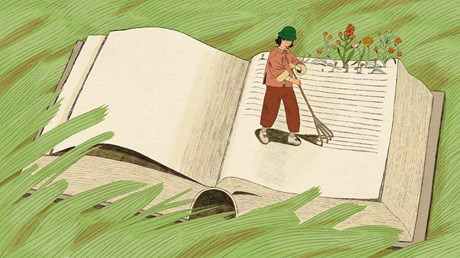As an ecologist, I believe that works of literature draw us closer to God and deeper into creation care.

In my senior year of college, I studied ecology in Costa Rica and Ecuador. For two weeks, I lived with other students on a small boat in the Galápagos Islands. On one of our excursions, the captain told us there were whales in the area, and I went up to the deck just in time to see a humpback swimming straight at the side of our boat.
At what seemed to be the very last second, the whale turned on its side and looked up at me. Staring into the eye of that whale was one of the most wondrous moments of my life. In that moment, I experienced awe and joy. I was deeply curious about the whale and felt compelled to act—to learn, to change, and even to protect.
That encounter lasted only a minute, if that, but it had a profound effect on me. In the years since then, I’ve had similar experiences while camping or hiking or wandering beyond a trail. Not everyone experiences creation in this way, nor is everyone physically able to hike through natural landscapes. Still others simply don’t have access.
Nevertheless, I believe everyone can pursue wonder by spending time in fictional landscapes.
On this topic, the works of C. S. Lewis have been significant to me. I remember the first time I “heard” Aslan’s song in The Magician’s Nephew:
In the darkness something was happening at last. A voice had begun to sing. … The voice was suddenly joined by other voices; … the blackness overhead, all at once, was blazing with stars. … The Lion was pacing to and fro about that empty land and singing his new song. … And as he walked and sang the valley grew green with grass. It spread out from the Lion like a pool. It ran up the sides of the little hills like a wave. In a few minutes ...
from Christianity Today Magazine
Umn ministry


.gif)

.gif)
.gif)
